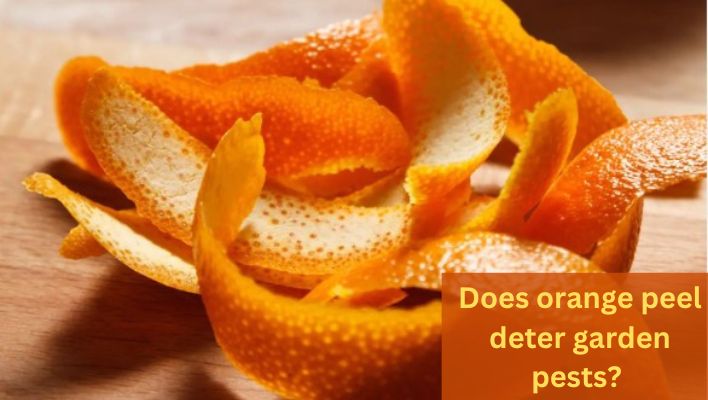Are you tired of battling pesky garden pests? You’re not alone! Many gardeners struggle to keep their plants healthy and thriving in the face of insect infestations. But what if there was a natural, easy-to-use solution that could help keep pests at bay?
These pesky critters can wreak havoc on your plants, leaving you with a less-than-stellar harvest. That’s why finding effective ways to deter pests is so important to gardeners. And one natural remedy that has been gaining attention in recent years is orange peel. But does it work? Can something as simple as citrus peel keep pests at bay?
Yes, you read that right! Orange peel, the same stuff you toss in the trash or compost bin, maybe the secret weapon you’ve been missing in your pest control arsenal. But does it work?
In this article, we’ll take a closer look at the science behind orange peel as a pest deterrent and give you some tips for using it effectively in your garden. By the end of this article, you’ll have all the information you need to decide if orange peel is a pest control method that’s right for you and your garden.
How do gardeners typically deal with garden pests?
Gardeners have a variety of methods for dealing with garden pests without needing the use of orange peel, ranging from traditional pesticides to natural remedies. Here are some common methods that gardeners use to control pests:
- Pesticides: This is perhaps the most well-known method for controlling pests. Gardeners can choose from a wide range of chemical and organic pesticides that are specifically designed to kill or repel pests. However, many gardeners are concerned about the potential negative impact of pesticides on the environment and human health, so they may opt for alternative methods.
- Companion planting: Some plants have natural properties that make them unattractive to certain pests. For example, planting marigolds alongside your vegetables can deter nematodes, while planting onions and garlic can deter aphids and other pests.
- Beneficial insects: Just as some plants repel pests, others attract beneficial insects that prey on pests. Ladybugs, lacewings, and praying mantises are just a few examples of beneficial insects that can help control pests in your garden.
- Homemade remedies: Many gardeners swear by homemade pest control remedies that use natural ingredients like soap, vinegar, and even beer. These remedies can be effective against a variety of pests, but it’s important to research and follow proper application techniques to avoid harming your plants.
Gardeners have a range of options when it comes to pest control. The key is to choose a method that’s effective, safe, and environmentally friendly. In the next section, we’ll explore the potential benefits of using orange peel as a natural pest deterrent.

Can orange peel be used to deter garden pests?
Yes, orange peel can be used to deter garden pests. It’s been gaining attention in recent years as a natural pest control method. Here are some potential benefits of using orange peel as a pest deterrent:
- Citrus scent: Orange peel contains compounds that emit a strong citrus scent, which can be unpleasant to many pests. Some studies have shown that the scent of orange peel can repel insects like mosquitoes, ants, and cockroaches, among others.
- Citric acid: Orange peel contains citric acid, which is toxic to many types of pests, including slugs and snails. The acid breaks down the protective layer on the pests’ skin, causing them to dehydrate and die.
- Nutrient-rich: Orange peel is rich in nutrients like nitrogen, phosphorus, and potassium, which can help improve the health of your soil and plants.
While the use of orange peel as a pest deterrent has not been extensively studied, there is some scientific evidence to support its effectiveness. For example, a study published in the Journal of Economic Entomology found that the essential oil of sweet orange (Citrus sinensis) was effective at repelling the Asian citrus psyllid, a pest that can cause significant damage to citrus trees.
However, there are some limitations and potential downsides to using orange peel. For one, the scent may not be strong enough to deter all types of pests.
Additionally, orange peel can attract other animals, such as raccoons and rodents, who may be attracted to the scent of citrus. Finally, it’s important to note that while the orange peel is a natural remedy, it should still be used with caution and proper application techniques to avoid harming your plants.
Orange Peel as a Natural Pest Repellent
The chemical composition of orange peel includes various compounds that contribute to its pest-repelling properties, such as limonene, citral, and linalool. These compounds have been found to have insecticidal and repellent properties in various studies. Here’s how it works:
- Citrus scent: As mentioned earlier, orange peel contains compounds that emit a strong citrus scent, which can be unpleasant to many pests. The scent masks the smell of the plants and can confuse and deter pests, keeping them from damaging the plants.
- Citric acid: Orange peel contains citric acid, which is toxic to many types of pests. The acid breaks down the protective layer on the pests’ skin, causing them to dehydrate and die.
Limonene is a powerful insecticide that can be found in many commercial pest control products. It’s toxic to pests like fleas, ticks, and cockroaches, and it’s also effective at repelling mosquitoes.
Linalool, on the other hand, is a natural compound that has been shown to have a calming effect on insects. It can be found in many essential oils and is often used in aromatherapy.
Compared to other natural pest repellents, orange peel has several advantages. For one, it’s readily available and easy to obtain, especially if you regularly consume oranges. It’s also affordable and environmentally friendly, making it an attractive option for those who want to avoid harsh chemicals and pesticides.

Other natural pest repellents include garlic, neem oil, and peppermint oil, among others. These remedies also have their unique properties and benefits, but some may be less effective or more difficult to obtain than orange peel.
However, it’s important to note that orange peel may not be effective against all types of pests. Some pests may be more attracted to the scent of citrus, while others may be unaffected. In addition, the scent of orange peel may not last as long as other pest repellents, so it may need to be reapplied more frequently.
Overall, orange peel has shown promise as a natural pest repellent due to its citrus scent and citric acid content. While it may not be effective against all types of pests, it’s a safe and affordable option worth trying for gardeners looking for natural pest control methods.
Its unique chemical composition, combined with its nutrient-rich properties, make it a versatile and environmentally friendly option for gardeners looking to control pests without resorting to chemical pesticides.
How to use orange peel as a natural pest deterrent
If you want to use orange peel as a natural pest deterrent in your garden, here are some simple steps you can follow:
- Collect orange peels: Start by collecting the peels of oranges. Save the peels from oranges that you eat, or collect them from a local grocery store or farmer’s market. Make sure to remove as much of the fruit as possible, as this can attract pests rather than repel them. You can use peels from any type of orange, including navel oranges, blood oranges, and Valencia oranges.
- Dry the peels: Spread the orange peels out on a flat surface and allow them to dry completely. This can take anywhere from a few hours to a few days, depending on the humidity in your area.
- Cut the peels into small pieces: Use a sharp knife to cut the orange peels into small pieces. The smaller the pieces, the more surface area they will have, and the more potent their scent will be.
- Scatter the peels around your garden: Scatter the orange peel pieces around your garden, paying special attention to areas where pests are most likely to gather. You can place the peels directly on the soil, or you can hang them from branches or stakes using string or twine. You can also place small pieces of orange peel directly on or around plants that are particularly susceptible to pests.
- Replace the peels regularly: The scent of the orange peel will start to fade over time, so it’s important to replace them regularly. Depending on the weather and other conditions, you may need to reapply it every few days or after heavy rain.
- After saturation of entire plant, our spray will adhere to the target insect, egg case or larvae. It's active ingredients then cause disruption of respiration and digestion. It also penetrates to dehydrate their entire body. Insects can never become immune to this product because they can't get immune to suffocation or dehydration.
- Lost Coast Plant Therapy was designed to suffocate and dehydrate on contact. That is why it is important to thoroughly saturate your infested plants. If the product does not contact the insect it can't suffocate or dehydrate it.
- Many insects and diseases are killed on contact with one application. Others, take repeat application to eliminate the problem.
How to Use Orange Peel in the Garden
Using orange peel as a natural pest deterrent in the garden is easy. Here are a few methods for using orange peel:
-
- Scatter orange peel around your garden beds: Simply scatter small pieces of orange peel around the base of your plants, being careful not to touch the plant stems or foliage. The scent of the orange peel will help repel pests.
- Create an orange peel spray: You can create an orange peel spray by steeping the orange peel in hot water for several hours. Once the water has cooled, strain out the orange peel and pour the liquid into a spray bottle. Spray the mixture around your garden to repel pests.
- Use orange peel in compost: Orange peel is rich in nutrients and can be added to compost to help improve soil quality. The scent of the orange peel may also help repel pests in your compost pile.
Here are some tips and best practices to keep in mind when using orange peel as a pest deterrent:
- Use fresh peels: Fresh orange peels will have a stronger scent and be more effective at repelling pests.
- Experiment with different amounts: You may need to experiment with different amounts of orange peel to find the right balance. Too little may not be effective, while too much may be overwhelming or attract other animals.
- Combine with other natural remedies: Orange peel can be even more effective when combined with other natural remedies, such as garlic, onion, or chili pepper.
- Use caution around plants: While orange peel is a natural remedy, it’s still important to use caution and avoid getting it directly on your plants. The high acidity of citrus oils can damage or burn leaves, so it’s best to scatter the peels around the perimeter of your garden rather than directly on plants.
- Keep the peels away from your plants: While orange peel is generally safe for plants, it’s best to keep the peels away from the stems and leaves of your plants to avoid any potential damage or rot.
- Don’t rely on orange peel alone: While orange peel can be an effective pest deterrent, it’s best to use it in conjunction with other pest control methods, such as crop rotation, companion planting, and proper watering and fertilization techniques.
Types of Garden Pests Orange Peel Can Repel
Orange peel can potentially repel a variety of common garden pests. Here are some examples:
- Aphids: These tiny insects feed on the sap of plants and can cause stunted growth and yellowing leaves. Orange peel contains compounds that repel aphids and can be effective in deterring them from your plants.
- Ants: Ants can be beneficial in the garden, but they can also protect and farm other pests such as aphids. Orange peel can repel ants and discourage them from farming pests on your plants.
- Slugs and snails: These slimy creatures can eat holes in leaves and damage young plants. Orange peel contains compounds that are toxic to slugs and snails, making it an effective deterrent.
- Fleas and ticks: These pests can be a nuisance to pets and humans alike. Orange peel contains compounds that repel fleas and ticks, making it a natural and safe way to protect your pets and family.
- Mosquitoes: Mosquitoes can be a nuisance in the garden, and their bites can be irritating and even dangerous in some cases. Orange peel contains compounds that repel mosquitoes and can help protect you while you’re outside.
- Whiteflies: Whiteflies are tiny, sap-sucking insects that can cause damage to a wide variety of plants. Orange peel contains compounds that can repel whiteflies and prevent them from infesting your garden.
- Weevils: Weevils are a type of beetle that can cause damage to plants by eating leaves and roots. Orange peel contains compounds that can help repel weevils and keep them away from your garden.
- Caterpillars: Caterpillars can be a major pest in the garden, as they can quickly strip plants of their leaves and foliage. Orange peel contains compounds that can deter caterpillars and help protect your plants.
- Rodents: Rats, mice, and other rodents can be a major problem in the garden, as they can eat seeds, bulbs, and other plant material. Orange peel can help repel rodents by creating a scent barrier that they are reluctant to cross.
While orange peel can be effective in repelling some garden pests, it’s important to note that it may not work against all types of pests. Additionally, the scent of orange peel may not last as long as other natural pest repellents, so you may need to reapply it more frequently.
It’s also important to use caution when using orange peel as a pest repellent. The high acidity of citrus oils can damage or burn leaves if applied directly to plants, so it’s best to scatter the peels around the perimeter of your garden or in areas where pests are likely to be present. Additionally, orange peel may not be effective in large quantities, so it’s best to start with a small amount and monitor its effectiveness before increasing the amount you use.

Other Benefits of Orange Peel in the Garden
In addition to its pest-repellent properties, orange peel can also provide several benefits to your garden. Here are some other benefits of orange peel in the garden:
- Nutrient content: Orange peel is a rich source of nutrients, including calcium, potassium, and magnesium. When added to the soil, orange peel can help improve soil fertility and promote healthy plant growth.
- Soil improvement: Orange peel contains organic matter that can help improve soil structure and water retention. Adding orange peel to your compost pile or using it as a soil amendment can help improve the health and productivity of your garden soil.
- Composting: Orange peel can be easily composted to create a nutrient-rich soil amendment. To make orange peel compost, chop the peels into small pieces and add them to your compost bin or pile. Be sure to mix the orange peels with other organic materials, such as leaves or grass clippings, to ensure a balanced mix of nutrients. Over time, the orange peel will break down and add valuable nutrients to your compost, which can then be used to fertilize your garden.
To maximize the benefits of orange peel in your garden, consider incorporating it into your regular gardening routine. Use orange peel tea as a foliar spray to provide a boost of nutrients to your plants, or add chopped orange peel to your garden beds to improve soil structure and fertility. With its many benefits, orange peel is a versatile and valuable addition to any garden.
While orange peel can provide valuable nutrients and improve soil quality, too much of it can be overwhelming for plants and may lead to nutrient imbalances or other issues. As with any natural garden remedy, it’s important to use orange peel in combination with other best practices for gardening to ensure a healthy, thriving garden.
- TREATS AND CONTROLS PLANT DISEASE - Maintain the health of your plants with Earth’s Ally fungicide spray. Tackle common plant diseases including powdery mildew, downy mildew, blight, canker, black spot and leaf spot.
- SAFE FOR PEOPLE, PETS & PLANET - Formulated with citric acid, Earth’s Ally Disease Control is a natural fungicide spray that cures and prevents common plant diseases.
- NO HARSH CHEMICALS – A safer alternative to harsh chemicals that leaves behind no harmful residues. Use our garden disease control on fruits, vegetables, flowers, ornamentals, trees and shrubs.
Does orange peel deter garden pests FAQs
Can orange peel be used to deter all types of garden pests?
While orange peel is effective at repelling many common garden pests, it may not work for all types of pests.
Some pests may be more attracted to certain types of plants or may have a stronger sense of smell that is not deterred by the scent of orange peel. However, orange peel can be a useful natural pest control method for many types of pests, including ants, aphids, and slugs.
How often should orange peel be applied to be effective?
The frequency of orange peel application will depend on the severity of the pest problem and the size of your garden. For best results, it’s recommended to apply fresh orange peel every few days or as needed.
This will help to maintain the strong scent of the orange peel, which is what repels the pests. Additionally, it’s important to replace the orange peel as soon as it starts to dry out or decompose, as this can reduce its effectiveness.
Can orange peel be harmful to plants?
When used in moderation, orange peel is unlikely to harm plants. It can provide valuable nutrients and improve soil quality. However, it’s important to avoid applying too much orange peel, as this can create nutrient imbalances or other issues
Additionally, it’s important to avoid applying orange peel directly to plant leaves or stems, as this can cause burning or other damage. It’s important to use orange peel in moderation and to follow proper application methods to avoid any potential harm to plants.
Can orange peel be used in combination with other pest control methods?
Yes, orange peel can be used in combination with other pest control methods, both natural and synthetic. For example, orange peel can be used in combination with companion planting, which involves planting certain types of plants together to deter pests.
For example, orange peel can be used in combination with other natural pest control methods like companion planting, crop rotation, and physical barriers. Orange peel can also be used in combination with other natural pest control methods, such as neem oil or diatomaceous earth.
However, it’s important to avoid using orange peel in combination with synthetic pesticides, as this can create harmful chemical reactions.
Are there any other uses for orange peel in the garden?
In addition to its use as a natural pest control method, orange peel can be used to improve soil quality and provide valuable nutrients to plants. Orange peel can also be used to create a natural, citrus-scented air freshener for outdoor spaces.
Additionally, orange peel can be added to compost piles or bins to provide valuable organic matter and nutrients to the soil. Simply steep chopped orange peel in water to create a fragrant cleaning solution, or hang dried orange peels in the garden to help freshen the air.
Conclusion
Orange peel is a versatile and effective natural pest repellent that can be a great addition to any gardener’s toolkit. With its high levels of limonene and other compounds, orange peel can help keep a wide range of pests at bay, from aphids and ants to snails and slugs.
In addition to its pest-repelling properties, orange peel also offers other benefits for the garden, such as providing valuable nutrients and improving soil quality. And with its easy availability and low cost, orange peel is a great alternative to chemical pesticides and other artificial pest control methods.
Using orange peel in the garden is not only an eco-friendly and affordable option, but it also has additional benefits such as improving soil health and providing nutrients for plants.
However, it is important to keep in mind that orange peel may not be a one-size-fits-all solution for pest control, and its effectiveness may vary depending on the type of pest and the severity of the infestation. It is also crucial to use orange peel safely and responsibly, following proper precautions and guidelines.
Using orange peel in the garden is a safe, natural, and effective way to protect your plants from pests and improve their overall health. incorporating orange peel into your pest control routine can be a great addition to maintaining a healthy and thriving garden.


